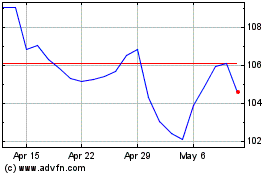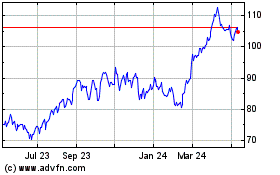Shell Deals Forsake Canada's Oil Sands -- WSJ
March 10 2017 - 2:02AM
Dow Jones News
Company pulls back from high-cost source in push to cut debt and
tighten its focus
By Michael Amon and Sarah Kent
LONDON -- Royal Dutch Shell PLC is selling nearly all of its
Canadian oil-sands developments in deals worth $7.25 billion,
deserting a region that has come to symbolize the risks for energy
companies in high-cost, carbon-intensive sources of oil.
The deal marks a another milestone in an ambitious plan by the
British-Dutch oil producer to sell off $30 billion of assets by
next year to help pay down debt and streamline the company
following its roughly $50 billion acquisition of BG Group PLC in
2016.
Selling the Canadian assets also cements a shift by Shell toward
deep-water oil projects and the fast-growing liquefied natural gas
market.
"We want to be a player that is world-class in integrated gas,
world-class in deep water," Shell Chief Executive Ben van Beurden
said in an interview at the CERAWeek conference in Houston. "We
want to have a large petrochemical portfolio. Over time we want to
be a world-class new energies player. There's only so many things
you can aspire to be at scale at and put money into."
Shell is pulling back from the Canadian oil sands only weeks
after its biggest rival, Exxon Mobil Corp., signaled that some of
its planned production had become unprofitable there at current
prices, and removed about 3.3 billion barrels of oil from its
stated reserves mostly as a result of the oil sands.
In the deals announced Thursday, Shell is selling a host of
oil-sands developments to a subsidiary of Canadian Natural
Resources Ltd., a Calgary-based company with significant oil-sands
interests. The deal includes Shell's Carmon Creek, a project it
abandoned in 2015 with a write-down of about $2 billion as oil
prices crashed.
The moves by Shell and Exxon highlight a stark reversal of
fortunes for Canada's oil sands. In the decade leading up to the
oil-price collapse of 2014, some of the world's biggest energy
companies raced to build megaprojects in northern Alberta, spending
an estimated $200 billion to tap reserves of heavy oil.
But the oil sands' high fixed costs and emissions levels, and
the long time horizons required to deliver a return on investment,
have deterred new spending there and made reserves less profitable
to tap.
Canada's oil output isn't expected to fall, because projects
that were already being built continue to add new barrels. But more
than 17 oil-sands projects that would have added about 2.5 million
barrels a day have been canceled or delayed, according to Arc
Financial. Companies have taken write-downs that total more than
$20 billion since 2012.
Tough new environmental rules, including a cap on emissions and
a carbon tax, are also chilling investment.
In an interview before the Shell announcement, Alberta Premier
Rachel Notley said she was encouraged by signs of investment
returning. Ms. Notley pointed to recent moves toward building a
pipeline that would carry more Canadian crude to the West Coast as
a positive sign for the industry, and said companies are also
finding new ways to bring down costs.
They are also finding ways to reduce emissions, so that even
with the introduction of a hard cap, "we can increase production
while staying under the cap," she said.
Shell is retaining a 10% interest in one oil-sands project known
as Athabasca, in a new joint venture with Canadian Natural. The
partnership will buy the 20% stake of Marathon Oil Corp.'s Canadian
subsidiary in Athabasca. Shell is also maintaining some processing
facilities in Alberta.
Write to Michael Amon at michael.amon@wsj.com and Sarah Kent at
sarah.kent@wsj.com
(END) Dow Jones Newswires
March 10, 2017 02:47 ET (07:47 GMT)
Copyright (c) 2017 Dow Jones & Company, Inc.
Canadian Natural Resources (TSX:CNQ)
Historical Stock Chart
From Mar 2024 to Apr 2024

Canadian Natural Resources (TSX:CNQ)
Historical Stock Chart
From Apr 2023 to Apr 2024
